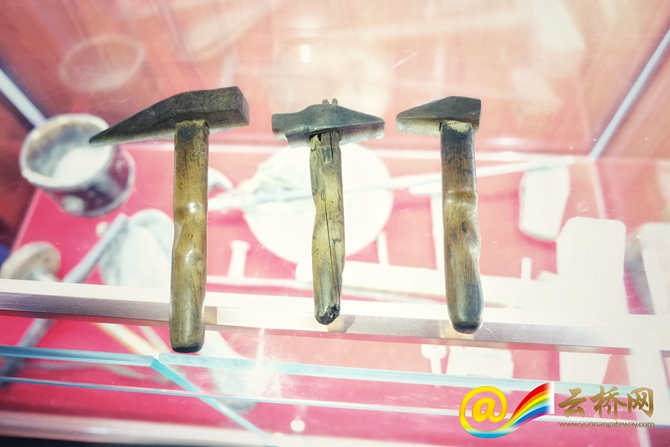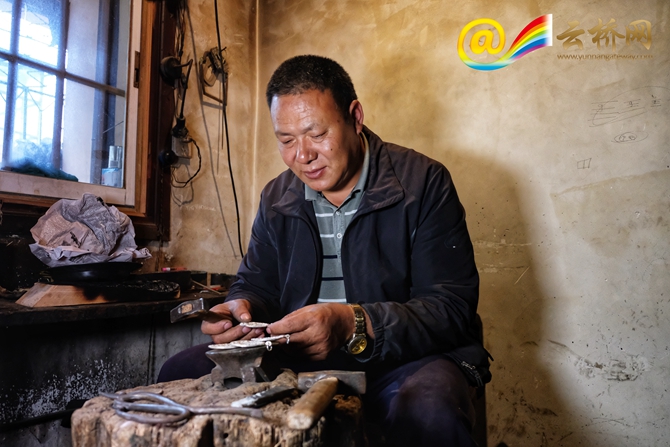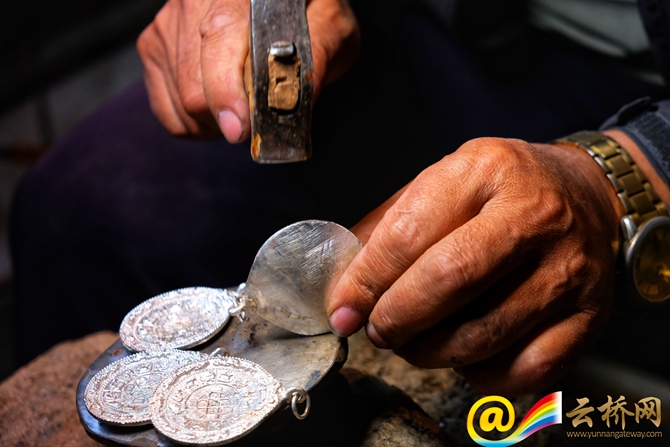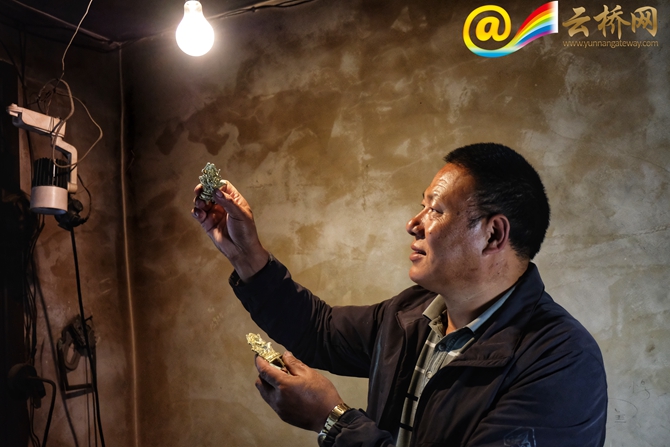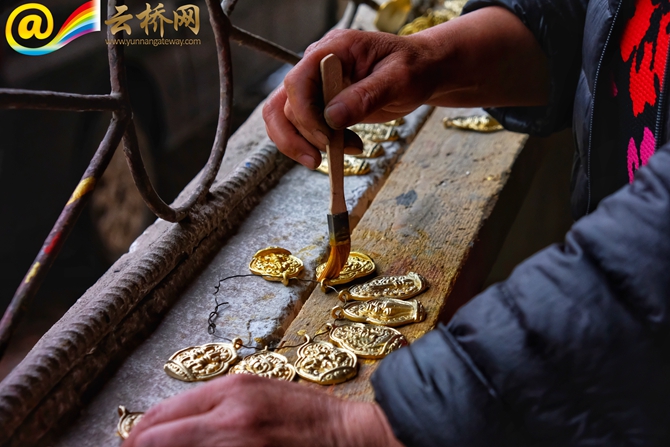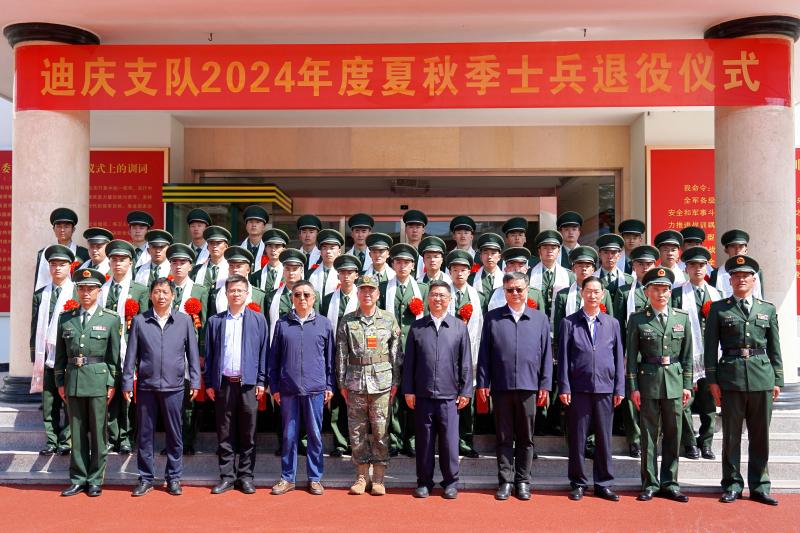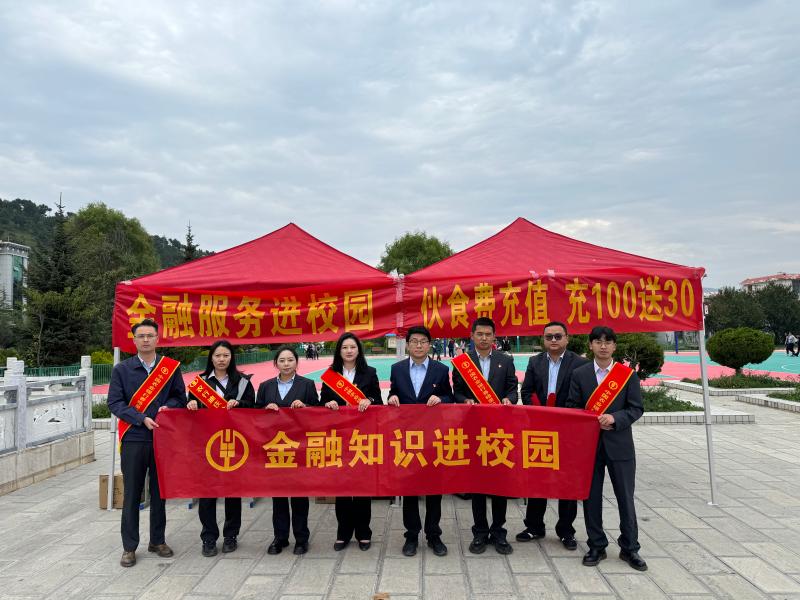|
3把小锤静静躺在陈列柜里,经过13代600多年的传承,手柄处凹痕明显。“这是一代代传人手捏锤柄留下的印迹,也是这项传统技艺得以代代发扬的佐证。”55岁的洛桑扎西手指轻轻抚过这些家传的金属打制工具,眼睛中闪耀着自豪的光彩。 Three hammers, with hand imprints on the handles, have been kept in the family of Lobsang Tashi for more than 600 years. “This imprint here is the evidence of the development of the traditional technique from generation to generation,” Lobsang Tashi said proudly while stroking the hammers in the showcase.
作为藏族传统金属铸造工艺第14代传承人,我省首批省级非物质文化遗产传承人、省级工艺美术大师,洛桑扎西是中国藏区很有名的金属制品制造大师,他设计并制作的镏金佛像,5件已成国家民族博物馆馆藏精品;他亲手打造的藏刀,喜爱者数年难求;他打制的银饰品,游客趋之若鹜。凭着一手出神入化的绝活,洛桑扎西将其世代相传的藏族金属铸造工艺从偏远的羊拉乡羊拉村带到了德钦,带到了海外,并将其发扬光大,成为独一无二的非物质文化遗产。 Lobsang Tashi, 55, is the 14th-generation inheritor of traditional metal casting technique. He was among the first batch of provincial inheritors of intangible cultural heritage and also a provincial master of art and crafts in Yunnan. Lobsang Tashi specializes in metal manufacturing: Five of his works have been collected by Chinese National Museum of Ethnology; To get a Tibetan knife forged by him, you have to order in advance and wait for years; Silver ornaments he made are favored by numerous tourists. Based on fine Tibetan casting craftsmanship passed down for generations, Lobsang Tashi has promoted overseas the unique intangible cultural heritage.
8月的德钦,冷雨淅沥。一早,洛桑扎西就到了山坡上的小工厂里。松茸季,工人不多,只有几个人在里面做着各类小饰品的最后加工。他看了一圈,习惯性地坐在传统的木台前,拿起小锤开始给银制的十二生肖吊牌定型。“你现在已经是大师了,还每天都到工厂来吗?”记者好奇地问。洛桑扎西笑了:“我巴不得一整天都呆在工厂里。可是时间真不够用!这里是清华、中央美院、云大、民大、云艺等高校的非遗传习基地,年年都有本科生和研究生到这里参观学习;我这儿还是省级的技师工作站,每年都要为本地待业人员开展3次培训,最近一期的培训前两天刚刚才结束;我是本地小有名气的藏文化传承人,每年有不低于百场的传统婚礼主持;我熟悉藏文化中的很多艺术门类,凡是涉及到相关作品的鉴定,都会邀我到场……”停下手中的活,洛桑扎西疲惫地笑笑。“你累不累呀?”旁边有人问。“累!可是这些事儿必须要做。”一问一答中,这个康巴汉子身上的韧性和刚性显露无遗。 Lobsang Tashi’s factory lies in Deqin County, Diqing Tibetan Autonomous Prefecture, Yunnan Province. There, workers were processing accessories, while Lobsang was finalizing the design of tags for twelve zodiac signs. “Do you need to get to the factory so often, as a master?” asked a visitor. Noting he is willing to stay here the whole day, Lobsang Tashi said the factory is the intangible cultural heritage study base for various universities, and undergraduate and graduate students are common visitors here. As a provincial work station for technicians, the factory also provides three training sessions annually. Thanks to his fame, Lobsang Tashi is invited to host at least 100 wedding ceremonies every year. And when it comes to appraising events on Tibetan culture, he will surely be invited to. “Tiring indeed, but such businesses are all worth my efforts,” said Lobsang.
对洛桑扎西而言,必须要做的事儿,就是把藏民族优秀的文化艺术和工艺代代传承下去。在当地政府和非遗机构的大力支持下,他在德钦城的中心地段办起了藏族金属技艺生产性保护传习中心,里面陈列着其祖传至今14代的多样物品:小锤、风箱、宝木碗、白银小象财神、书籍……这些标刻着时间印记和传承温度的物件让洛桑扎西备觉自豪。 The most worthy doing, for Lobsang Tashi, is to pass down the fine craftsmanship in Tibetan culture. With the support from local cultural authorities and institutions, he has set up a protection and study center for Tibetan metal techniques in the Deqin county seat. There preserved antiques such as little hammer, bellows, treasured wood bowl, silver elephant, the god of wealth, books and so on, all of which were passed down from 14 generations and are what he is proud of. “我们家是全国藏区唯一代代相传的工艺世家,世代生产传统的藏民族用品和首饰。作为家中的长子,我从小跟着家族工艺的13代传人——父亲洛桑西劳学习工艺。12岁,刚打出第一把藏刀,父亲就带我走南闯北学习手艺,最远到了尼泊尔的加德满都。”那段在路上的学艺经历,最令洛桑扎西难以忘怀。正是经过数十年的行走、学习和创新,让洛桑扎西的手艺较之家族的前十几代传人,有了很大不同。他的作品,种类繁多形式多样,传统中有现代元素,古朴中有时代气息。 Lobsang Tashi said his family is the only one in China which inherits the craftsmanship of traditional Tibetan articles and ornaments for generations. And as the eldest son, he learnt from his father, Luosang Xilao, the 13th inheritor. His father took him out to see the world after he made the first Tibetan knife at 12 and they reached as far as Katmandu in Nepal. Having finished the learning journey, Lobsang created works totally different from those of his ancestors. His works are in greater variety and combine traditional elements with modern ones.
这和他身上的气质很相像,这是一种迥异于传统工匠的气质,他认为是“文化气”。洛桑扎西是个永远不知疲倦的学习者。他在昆明冶金工校进修过3年,又多次到北京、上海、广州和香港学习,并在当地政府支持下4次远赴国外求学。他利用学到的冶炼技术,改良金属表面处理及铸造,让金属制品看上去更有质感。他结合自己学文化行四方的“底子”,让作品拥有了多文化融合的“面子”,使之为更多人接受和喜爱。 An artistic work reflects the maker’s temperament. Lobsang Tashi believes it is an air of culture.As a persistent learner, he studies in Kunming, capital of Yunnan Province for three years and furthered his study in Beijing, Shanghai, Guangzhou and Hong Kong. Lobsang was also schooled four times abroad and therefore he improved the texture of metal surfaces with the help of metallurgical techniques he learned. Due to the exquisite techniques and the trying of cultural integration, his works are well-accepted and loved by many.
“家族的传承和现代工艺的融合,藏族文化和多民族文化的融合,使我的作品和别人很不一样。只有这样,才能让传统技艺呈现出巨大的生命力”。从柜台里拿出一把藏刀,洛桑扎西认真地指给记者看:“看这把藏刀,上面有我们名刀世家独有的条纹、云纹和花纹。看这个十二生肖,各民族的人都喜欢。看这尊镏金佛像,吉祥如意,本地人和游客都爱买。” “The integration of tradition and modernity and the fusion of Tibetan culture and cultures from other ethnic groups are keys for my works to make a difference. That’s why you can see vitality in them,” said Lobsang Tashi. Showing his guests a Tibetan knife and a gold-plating Buddha, Lobsang said when traditional patterns integrated some special elements like twelve zodiacs, handiworks are popular among locals and tourists alike. 洛桑扎西家的展示销售厅里,精美的金属制成品吸引着众多的购买者。他们中既有本地藏族,也有来游玩的各国游客。“民族工艺只有让更多人喜爱,才会有生命力。1998年,我成立了德钦县民族用品开发有限责任公司。托改革开放的福,这几年我的生意非常好,收入很可观。上个月,我的旅游商店的营业收入就是30万,而公司的年销售额可以到2000多万。这说明,传承到14代的藏族传统金属工艺品,有了越来越多的欣赏者。” In the exhibition hall packed with tourists, Lobsang Tashi added that the affection from consumers is the best motivation of the industry. “I started up a company in 1998 and thanks to the reform and opening-up policy, it is in good business.”“The income of the tourist shop last month was 43,000 dollars and the annual turnover of the company can reach more than 2.9 million dollars in a whole year,” said Lobsang, smiling. More and more people are becoming fans of metal products from the 14th-generation of Tibetan metal crafts.
“家族的传承不能断,我的两个儿子,有一个必须回到家里学习技术。”对于这项非遗技术的传承,洛桑扎西很坚定。大学毕业已到当地电视台工作的大儿子,在父亲的要求下,正准备回家学习藏族传统金属铸造工艺,做下一代的传承人。 Lobsang Tashi takes the family inheritance seriously. He urged his two sons that one of them should come back and he’s going to pass down the craftsmanship to the next generation. His elder son, who works for the local TV station, is about to learn the traditional Tibetan metal casting techniques as the 15th-generation inheritor. 云南日报全媒体记者 熊燕 储东华 张若谷 李文君 编译 李恒强 |
【文化迪庆有传人】洛桑扎西的金属手工艺品:赶上了好时代赢来了大市场
来源:香格里拉网 作者: 发布时间:2018-09-17 16:27:18

频道精选
- 2024 年迪庆州新闻系列综合高级职称定向评审通过人员名单公示2024-09-05
- 香格里拉景区直通车:便捷出行,一站直达美景2024-09-05
- 香格里拉景区直通车:便捷出行,一站直达美景2024-09-05
- 张卫东到迪庆交通运输集团公司开展调研2024-09-05
- 福彩代销者:增强责任意识 倡导理性购彩2024-09-04
- 中央专项彩票公益金的用途及作用|下篇2024-09-04
- 中央专项彩票公益金的用途及作用|中篇2024-09-04
- 中央专项彩票公益金的用途及作用|上篇2024-09-04
- @迪庆人,这场活动需要您的参与!2024-09-04
- 积极参与2024年“99公益日·助力迪庆见义勇为”宣传募捐活动倡议书2024-09-04
